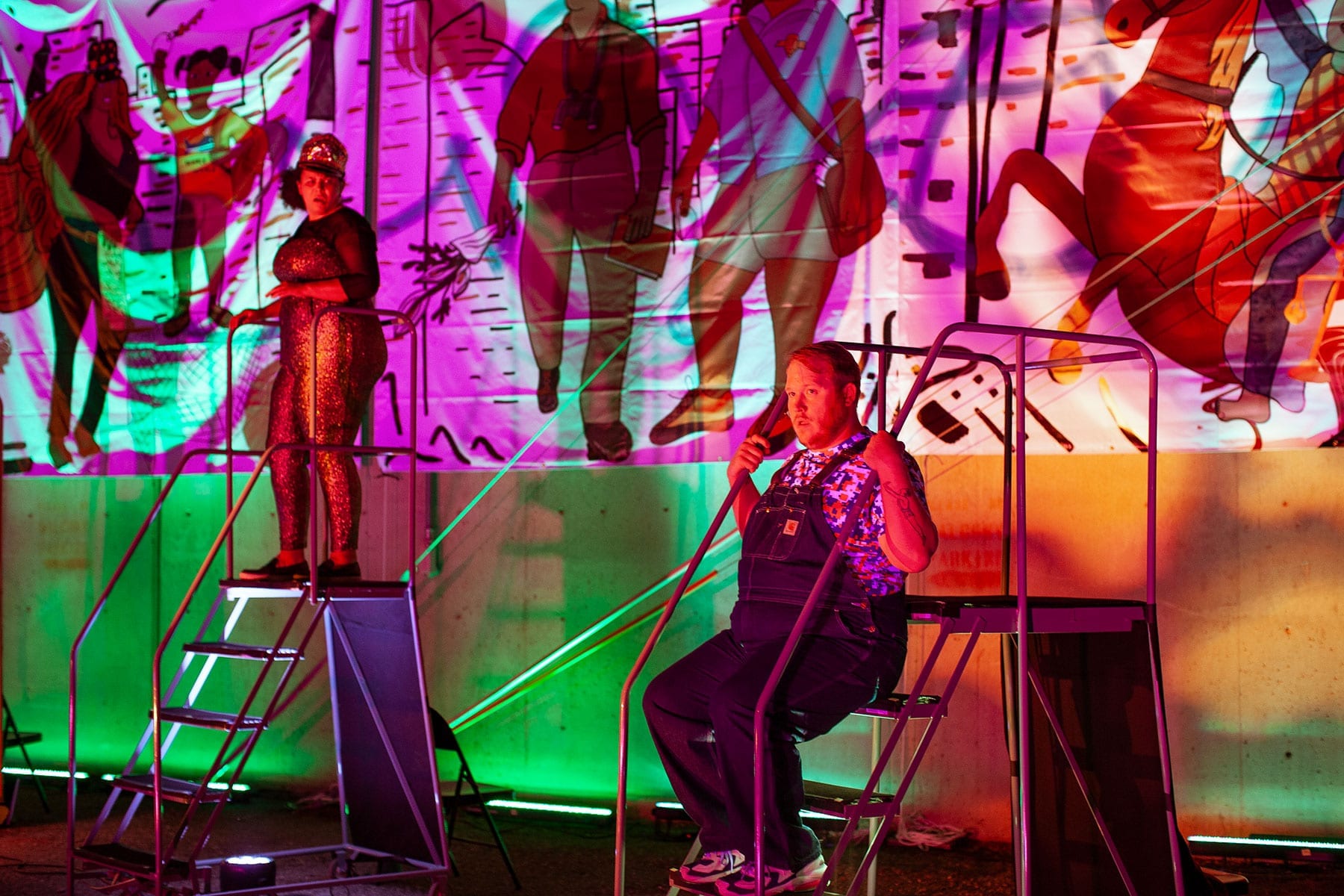OGDEN — Catharsis Two: Inside Voices, a new jukebox musical written by local playwright and producer Camille Washington, is an amusing and thought-provoking look at the experience of a young woman, played by Franki Ferreira, stuck inside an ICE camp at the border, as she follows the Constitution, played by Alicia Washington, to search for The New Normal where everyone might be able to see Justice, played by Mack, together.

In this latest production by Good Company, the audience is treated to another carefully thought-out socially-distanced show. The audience member has a choice of two different “box” seating options: one with three seats for $35 or one that can seat up to six people for $70. The seating is in the parking lot of the venue, and the boxes are spaced much more than six feet from one another so that the audience is well-distanced from one another and the stage, while the view from each of the boxes seemed to still be good enough to enjoy the show. I was also impressed by the attention that was paid in the staging to the safety of the cast and crew, with staircase risers for each of the players so that they never had to come within six feet of each other, giving them a safety as they sang and interacted, yet still being able to have an intimacy that director Alicia Washington has magically been able to develop between the players while maintaining the distance.
Technical Director Austin Hull certainly had his work cut out for him. Putting on a production in a parking lot that is safe and socially distant, subject to weather, outside sound and elements, and technical difficulties is never something that can be described as simple. The night was not without its downsides, but Hull handled them with dignity. Everyone was lucky that the one mic that decided not to work belonged to Mack, who really does not need a mic. I have attended a few Theatre Critic conferences where some of the critics lament the old days where the greats of yesteryear could perform to a sold-out house without amplification, and they all say no one can project like those greats anymore. Well, those critics have never heard Mack perform. Mach did not miss a beat, and I did not miss a word or a note when the mic was not working. Hull quickly and safely fixed it all while maintaining safety protocol. The lighting design by Stephen Simpson added to the evening. Outdoor performing arts represent a difficult area in lighting design, because natural and artificial lights compete with one another and because a designer needs to understand the nuances of both lighting types and how to work with them. Simpson utilized both lights in his favor and to the favor of the performers.

And why do I bother to care about safety protocol at all? Partly because the performing arts has been temporarily crippled by it and partly because Camille Washington’s clever satirical journey through the political landscape the world is currently facing was thought-provoking, sometimes painful, amusing, and also a reminder that there are many who are not at all safe at this time. To see a company work so hard to maintain safety and give an outlet to performers and creators is heartwarming. One of the final scenes within the show finds the characters right back within an ICE facility, and it reminded me that the safety and security I wake up with daily is indeed a privilege not afforded to many. When attending this show, it is certain that audience members may be uncomfortable in their seats when being confronted with the concept of privilege, but that is something that good art expects us to do.
Being a jukebox musical, the music that Camille Washington pulled together was eclectic and sometimes unexpected. A surprising moment for me was the song, “Crazy,” sung by performer Dustin Bolt, which I felt gave some perspectives into a caricature of a person that I usually struggle to find sympathy for. First it can be said that Bolt has a strong and soothing voice that I truly enjoyed, but even more, his connection to the song made me feel a great deal of understanding into why a person might feel the feelings that were portrayed in that moment of the story. The satire got deep and, if I may, cathartic. Music director Karin Gittins had many moments in the show that are worthy of praise; the, “Crazy,” moment is just one example.
The final song of the show was a wonderful reminder that people can work together, get over differences, and get along. I was smiling under my mask and clapping along when my proud “Gen Z” daughter turned to me and said, “I love it; this is totally the Arthur theme song.” I told her no way, and we asked someone after who said it was by Chance the Rapper. My daughter then used her skills on the internet to prove to me it was both and that being a PBS kid will in fact save the world. I have to agree that she is probably right, and it would be good if we could all learn to get along with each other.
[box]Catharsis Two: Inside Voices plays at Good Company Theatre in the parking lot (2420 Wall Avenue, Ogden) Thursday through Saturday at 7:30 PM until October 3, 2020. Tickets are $35 for a small box (seats up to three people) and $70 for a large box (seats up to 6 people). For more information, please visit their website.[/box]
